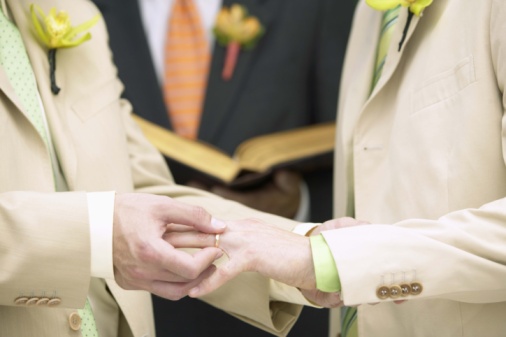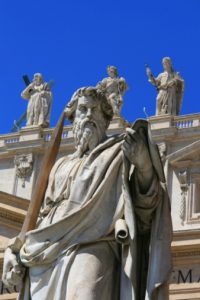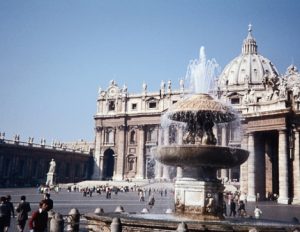 The issuing of the declaration entitled, Fiducia supplicans, by the Dicastery for the Doctrine of Faith (DDF) on December 18 was meant to open the door to allow same-sex couples to receive a form of blessing in the Church, but many experts say it is opening the door to a great deal of confusion and controversy as well.
The issuing of the declaration entitled, Fiducia supplicans, by the Dicastery for the Doctrine of Faith (DDF) on December 18 was meant to open the door to allow same-sex couples to receive a form of blessing in the Church, but many experts say it is opening the door to a great deal of confusion and controversy as well.Even though the document makes it clear that Church teaching on marriage does not change and that the blessing referred to in the document does not signify approval of “irregular” unions, the U.S. Conference of Catholic Bishops has already found it necessary to issue a statement about the declaration:
“The Church’s teaching on marriage has not changed, and this declaration affirms that, while also making an effort to accompany people through the imparting of pastoral blessings because each of us needs God’s healing love and mercy in our lives.”
The bishops refer to the document which states that “Although it is impossible for us to bless a same-sex union, since any sexual-union outside of the marriage of one man and one woman is contrary to the Gospel, we may bless individuals who are not yet living in full accord with the Gospel, even those in a same-sex union. This is not a marriage blessing and should never be done in a liturgical or ceremonial way which would give the false idea of blessing a union contrary to the Gospel. It is not legitimate to use the Book of Blessings or any official ritual for blessing a union contrary to God’s law. This is a blessing for persons who ‘recognizing themselves to be destitute and in need of his help—do not claim a legitimation of their own status, but who beg that all that is true, good, and humanly valid in their lives and their relationships be enriched, healed, and elevated by the presence of the Holy Spirit’ (FS, 31).”
For this reason, the declaration clearly instructs that in order to avoid any form of confusion or scandal, the blessing cannot be conferred in concurrence with a civil union or even in connection with a civil union. Nor can it be performed with any clothing, gestures, or words that are proper to a wedding.
 As Vatican News explains, the document goes on to distinguishes between ritual and liturgical blessings and those spontaneous blessings that are more like signs of popular devotion. “It is precisely in this second category there is now consideration of the possibility of welcoming even those who do not live according to the norms of Christian moral doctrine but humbly request to be blessed.”
As Vatican News explains, the document goes on to distinguishes between ritual and liturgical blessings and those spontaneous blessings that are more like signs of popular devotion. “It is precisely in this second category there is now consideration of the possibility of welcoming even those who do not live according to the norms of Christian moral doctrine but humbly request to be blessed.”
Because a liturgical blessing requires that “what is blessed corresponds with God’s designs written in creation,” the Church does not have the power to impart this kind of blessing on irregular or same-sex couples.”
However, it maintains that there are certain circumstances in which a non-liturgical spontaneous blessing of two people in a same-sex union could be pastorally appropriate.
“In its document, the DDF seemed to have in mind the possibility that people who identify as gay might approach a priest after a liturgy, or at a large shrine or pilgrimage site, or at an airport, even, and request a blessing,” explains J.D. Flynn of The Pillar.
“Anyone with pastoral experience knows that priests are regularly asked for blessings, and that a moral evaluation of a person’s entire life is not undertaken each time a priest blesses a stranger, or a person not well-known to them.”
Priests are asked for blessings “on the street” quite often, many times by people who are not living their Catholic faith, but imparting a blessing can be a powerful experience for them and even lead them to a deeper practice of the faith, Flynn writes.
“In that sense, it seems clear that the dicastery wants to advance the notion that a priest could distinguish between blessing people in a same-sex union, even together, and blessing the union itself — and that he should not regard himself as inhibited from offering a priestly benediction without inquiry if he is approached somewhat spontaneously by two people of the same sex.”
The problem with this approach is that some priests, concerned about causing scandal, will choose not to offer even a spontaneous blessing to a same sex couple. On the other hand, there may be priests who choose to disregard the limitations described in the document. Because the DDF explicitly states in the document that it won’t be issuing any further clarification on the issue, does this mean the Vatican will not correct those clergy in support of same sex marriage who misapply the document and “bend the rules”?
According to Flynn, theologians are already questioning the language used in the document, such as referring to same-sex unions as “irregular” or “inadmissible” which does not fully describe the Church’s position on these unions as being in violation of natural law. Others are unhappy with the term “same-sex couple” which is used in the document because it implies validation of the union.
 Not surprisingly, division over the document appeared almost immediately. Father James Martin, author of the book Building a Bridge: How the Catholic Church and the LGBT Community Can Enter into a Relationship of Respect, Compassion, and Sensitivity posted a jubilant message on X. “The declaration opens the door to nonliturgical blessings for same-sex couples, something that had been previously off limits for bishops, priests, and deacons. Along with many priests, I will now be delighted to bless my friends in same-sex unions.”
Not surprisingly, division over the document appeared almost immediately. Father James Martin, author of the book Building a Bridge: How the Catholic Church and the LGBT Community Can Enter into a Relationship of Respect, Compassion, and Sensitivity posted a jubilant message on X. “The declaration opens the door to nonliturgical blessings for same-sex couples, something that had been previously off limits for bishops, priests, and deacons. Along with many priests, I will now be delighted to bless my friends in same-sex unions.”
As the Catholic News Agency (CNA) reports, in a response to Martin, Father Ronald Vierling posted on X that “the goal of authentic pastoral practice is the conversion of sinners” and that “pastoral outreach must be subordinate to the imitation of Christ the Good Shepherd, whose consistent, unwavering call is to repentance and conversion of life.”
Stephen P. White, executive director of The Catholic Project at The Catholic University of America, told CNA that the declaration ultimately acknowledges that “God does not and cannot bless sin; but he can and often does bless sinners, particularly when they ask him for the grace to grow in holiness.”
He added that “the DDF warned repeatedly about the necessity of avoiding scandal and confusion” but that “any hopes of avoiding such confusion and scandal seem to have evaporated almost instantly upon publication of the decree.”
“This was entirely predictable: from the wildly misleading press coverage, to the triumphalism from advocates of scrapping the Church’s teaching on sex and marriage, to the insistence from certain corners of the Church that they are now free to do precisely what the decree forbids,” White said.
He was referring to the blessing of same-sex unions that has long been taking place in Germany and Belgium. These blessings have been taking place within liturgical settings which is in violation of the new document. What will the Vatican do about it?
As Flynn so aptly states, there is real possibility of schism within the Church over this issue.
“…[I]t is a fact that issues pertaining to the approbation or liturgical blessings of same-sex couples have been the source of fracture among the most prominent ecclesial communities. Given that schisms can occur in the Catholic Church, it would seem historically naive not to recognize the possibility over this issue.”
In light of this, “Pope Francis, or his successor, has a major weighing issue ahead of him: Eventually the pope will have to decide if tolerating the ‘spirit of Fiducia supplicans’ is worth the prospect of schism — or if he will have to take up the unpleasant task of cracking down on excess.”
Only time will tell, but one thing is certain - the Church needs nothing more right now than the steadfast prayer of the faithful.
© All Rights Reserved, Living His Life Abundantly®/Women of Grace® http://www.womenofgrace.com
